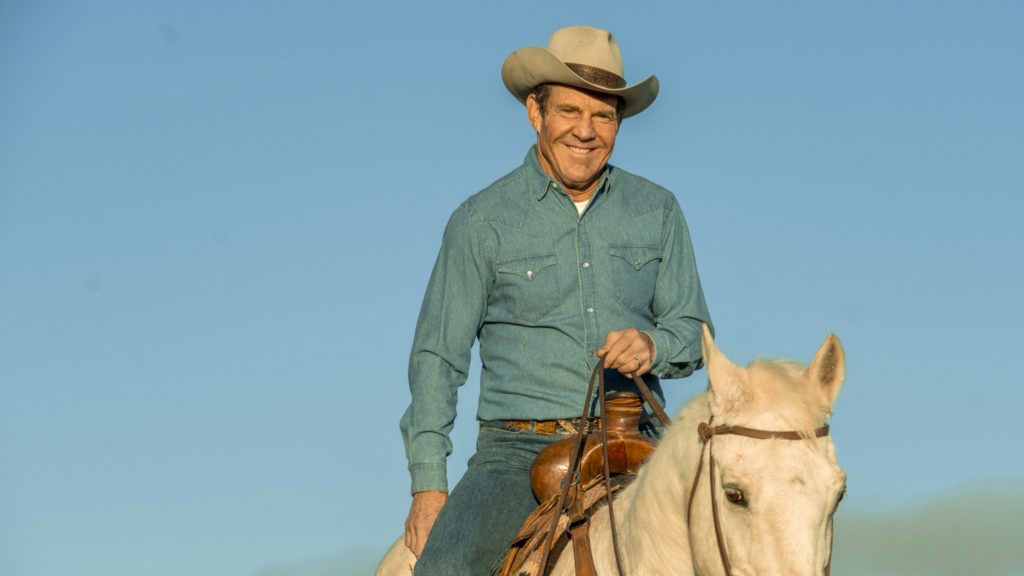It’s said there is more than one way to skin a cat. But what they neglect to mention is that no matter what method you deploy, you’re still stuck with a skinned cat.
That is how I feel about presidential biopics, even the ones that are well-made and feature our more potent POTUSes: Is it not enough to have our tax dollars and a library? Must we also give you a screen at the multiplex that could have gone to Russell Crowe playing an exorcist for the third time? The traditional box office success of such films, and the recent release of “Reagan” aspiring to join those ranks, suggests I’m alone on this one.
The film (in theaters Aug. 30) stars Dennis Quaid as the titular Gipper, with David Henrie playing young Reagan when the flashbacks wind back past the capabilities of Hollywood makeup. Recent presidential biopics, such as “Lincoln” and “Southside With You,” dial in to a single moment of a president’s life. “Reagan” has grander ambitions, covering the whole of the president’s 93-year-long life and showing no respect for the viewer’s bladder.
Even Reagan’s detractors will concede the man lived a life stranger than any of his B-movies. We’re taken on a whirlwind journey from Kinkadian childhood Illinois through Golden Age Hollywood to Vegas, Iceland, Moscow, even as far as Burbank. In this span Reagan runs for president three times, wins twice, marries twice, escalates and deescalates the Cold War, survives an assassination attempt and accidentally pulls one off against a goldfish.
Most novel is the film’s focus on Reagan as president of the Screen Actors Guild, a neglected chapter in his life story. There is divine synchronicity in the Great Communicator sharing a vocation with the vocally boisterous Fran Drescher.

The narrative is framed by a former KGB agent (Jon Voight) attempting to explain to a fellow agent why Reagan succeeded despite their efforts. The film is fittingly structured in a Russian nesting doll fashion, with the agent having to venture deeper and deeper into Reagan lore to explain just what made the man tick.
It will hardly be a shock to hear that the KGB agents walk away with hard-earned respect for Reagan. The film is a hagiography, and to its credit doesn’t hide it: ending your movie with the main character riding his horse off into the sunset is as open a declaration of love one can manage without shouting. I’ve seen marriages built on less.
I don’t use hagiography in the pejorative sense, of blinkered reverence and dubious citation. Rather, “Reagan” is hagiographic in the classical definition, structured like the biography of a saint. In the early snippets of childhood we see foreshadowing of his later deeds, digestible morales for the youngest Republicans.
The film runs like a highlight reel of his quasi-miracles; of economic resurrections and the slayings of Soviet goliaths and walking away from Iran-Contra with nary a scratch. In its boldest play it even hints at a real miracle, with a Protestant minister prophesying that Reagan will become president one day. This had to have happened, if only because Pat Boone is in that scene as a witness and that’s a preposterous detail to make up otherwise.
Reagan is made a saint even through ersatz Vatican procedure. The narrating KGB agents are quite literally devil’s advocates, poking and prodding through a life to see if it’s up to snuff. Their resigned concession to a worthy opponent is the closest a Russian gets to a compliment.
I was lucky enough to attend the premiere at the TCL Chinese Theatre, the shadowy Catholic cabal of Hollywood coming in clutch for this humble critic.
But even as I watched, my eyes kept getting dragged from the screen to the crowd below. I was distracted not only by the beautiful celebrities but by the ripples of adulation through the crowd below. They laughed, they cried, they anticipated every historical one-liner; spontaneous applause even broke out after one homily against taxation. It struck me as a genuine popular cult following. If I were a betting man, I’d wager half the thousand in the audience had made the pilgrimage to Simi Valley to visit his library.

Catholics are a plurality and not a majority of this country, though we remain safe from a wider Protestant coalition due to their infighting over casseroles. America remains numerically Protestant, which is why we make so many of these presidential hagiographies, and likely won’t stop soon. The human soul is drawn not just to larger-than-life figures, but to the ones we could someday become.
That’s the difference from a folk hero: as much as we admire Paul Bunyan, deep down we know we’ll never ride a great blue ox. Both saints and presidents thrive off the idea, however tenuous, that we can achieve it too. Presidents are the saints for the Protestants, a safe canon of heroes and a way to channel their secret Catholic desire for statues.
I’ll end with one final comparison to saints and their biographies. My favorite of these is not any of the Golden Legends with their miracles and martyrdoms but Augustine’s “Confessions,” where the written record is less about his greatness but rather how many times he messed up. Growing up I could never fully relate to the miracles of saints: I could barely make it to one location on time, let alone bilocate. I was, however, an intimate friend with failure, which is why I chose Augustine as my confirmation name.
Human frailty is what keeps saints from floating off into that Paul Bunyan sphere. Likewise, the strongest moments of “Reagan” are when the president is at his weakest: the montage of humiliation as he’s reduced to hocking products when his acting career fails, a career most famously spent opposite a monkey. The way he is dumped on a gurney rather than placed when rushed to the emergency room following his shooting.
But most touching of all is the scene where the reality of his Alzheimer’s finally sinks in, a glint peeking through the layers of his own confusion and a brave front. Here Reagan is allowed to be Ronald, his greatness not insisted upon, but risen to the challenge.

